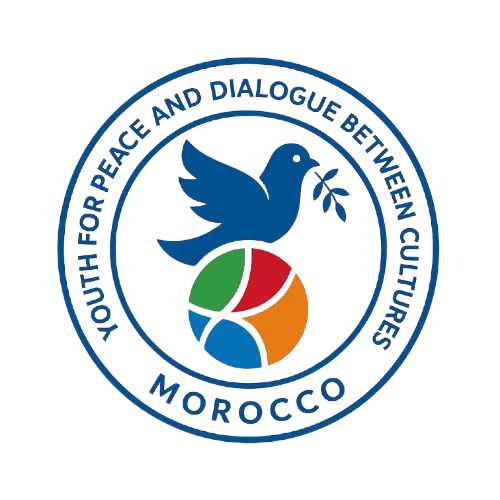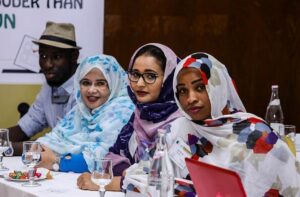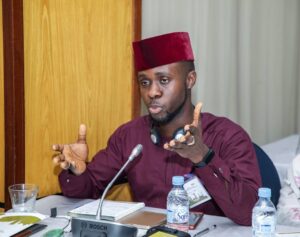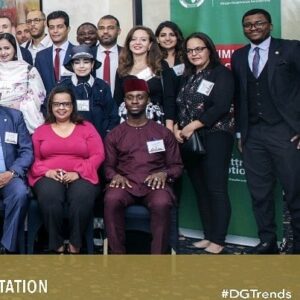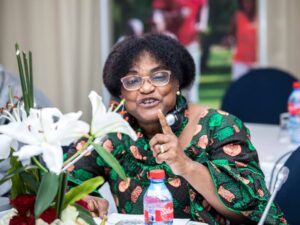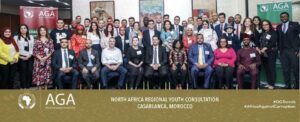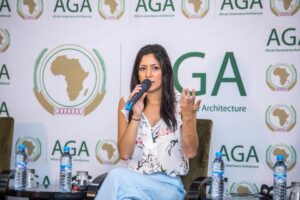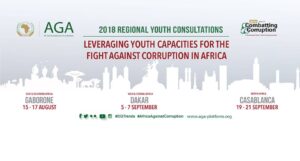The overall goal of the Regional Youth Consultations is to provide a collaborative, open and inclusive space to leverage and foster meaningful participation of young people in the fight against corruption in Africa.
The Consultations was convened under the auspices of the African Governance Architecture (AGA) Youth Engagement Strategy (AGA-YES). They focused on leveraging and reinforcing young people’s insights, capacities, and initiatives for preventing and fighting corruption in Africa.
The aim is to identify, support, strengthen and amplify youth perspectives on the sustainable fight against corruption. It also provided a platform for capacity building for youth-oriented and focused organisations/networks towards enhanced involvement in building a culture of personal integrity, transparency, and accountability in Africa; in addition to facilitating inter-regional exchanges and lessons learning.
Zakaria El Hamel moderating the first session of Day 2 for the North Africa Regional Youth Consultation with Khawla Ben Aicha, Member of Parliament, Tunisia speaking on strategies that have worked in the fight against corruption in her countryAnd with the participation of Mr Ehap Rady Founder ,Arab House Foundation for Human Rights ,.
This session is moderated by Zakaria El Hamel, President of Youth for Peace & Dialogue, Morocco. To discuss the topic are; Khawla Ben Aicha, aTunisian Parliamentarian & Ehap Rady, Founder, Arab House Foundation for Human Rights, Egypt.
Zakaria Said”” that The event was so Amazing!
Corruption is the abuse of entrusted power for private gain.It is one of the greatest evil that shakes the backbone of any society,The nation belongs to its youth. They are the makers of tomorrow. What they do today will reflect in the society tomorrow. To live in a society, that is corruption free, we need people with quality, of mind and thoughts. If those people come forward to build a strong nation, our dream of a corruption free society is never far away.””
Our Last Day in Casablanca was crowned with a Moroccan Traditional Dinner with Moroccan food and dance. We are very grateful to the Government of Morocco for this very lovely gesture and kind hospitality
Contextual Background
On July 11, 2003, the African Union (AU) Heads of State and Government adopted the AU Convention on Preventing and Combating Corruption in Africa(AUCPCC). The Convention which entered into force on August 5, 2006,signaledthe political commitment of African leaders to fight and combat the cancerous scourge of corruption on the continent. Togive effect to Article 22 of the Convention, the AU established in 2009, an Advisory Board on Corruption with a broad range of functions including to promote and encourage adoption and application of anti-corruption measures on the continent. These efforts are grounded in the commitment of African leaders as espoused in the Constitutive Act of the AU. The Act enjoins MemberStates to coordinate and intensify their cooperation, unity, cohesion and efforts to achieve a better life for the peoples of Africa.The Act specifically calls for the protection and promotion of human and peoples’ rights, consolidation of democratic governance and the rule of law, aswell as the promotion of social justice to ensure balanced economic development.
Corruption, a global phenomenon, continues to be at the heart of governance deficits in Africa. Without a doubt, it is a daunting challenge to good governance, sustainable economic growth, peace, stability, and development in Africa[1]. Corruption continues to negatively hamper efforts aimed at promoting democratic governance, socio-economic transformation, peace and security in AUMember States. According to the Report of the High-Level Panel on Illicit Financial Flows from Africa, popularly known as the Mbeki Report, Africa loses over fifty (50) billion US dollars every year through illicit financial flows. This huge drain on the resources continues to negatively impact on developmental efforts of the continent. If sustainable efforts are not put in place to address this challenge among other elements of corruption, attaining the goals of Agenda 2063 – Africa’s 50-year development blueprint – as well as the Global Sustainable Development Goals may be slow to achieve.
Corruption disproportionately affects people living in poverty andthose whose voices are marginalized, the significant majority of whom are young people and women[2]. Youth and women make up more than half of Africa’s population, andthey are both at the receiving end of the worst effects of corruption on developmental outcomes on the continent. Corruption exacerbates inequalities in society. Specifically, young people are impacted by corruption as experienced in the limited access to political, economic and social opportunities. The effects of these include a highrate of unemployment, limited access to public services, distrust in governance systems and frustrations which fuels radicalisationand forced migration through the Mediterranean Sea, amongst others. Without a doubt, turning the corner on sustainable prevention and fight against corruption requires a proactive and deliberate engagement of young people at all levels.
Given the above and as part of its efforts to prevent and fight corruption, the AU during its 30th Assembly of Heads of State and Government heldin January 2018 in Addis Ababa, Ethiopia launched 2018 as the African Anti-Corruption year. Thisfollowed the declaration made at the 29th Assembly of the Heads of State and Government in January 2017 to dedicate the theme for 2018 to“Winning the fight against corruption: a sustainable path to Africa’s transformation.”To further give political weight to this declaration, the AU Assembly designated H.E Muhammadu Buhari, President of the Federal Republic of Nigeria asthe Champion for the theme of the year, in recognition of the efforts made by H.E Buhari in the fight against corruption.
Through various activities and initiatives within the context of the theme of the year, the AU aims to rally various segments of the African society including AU Organs, Institutions, Regional Economic Communities (RECs) and the Member States; Civil Society Organisations, as well as citizens – women and young people alike – to address the urgent need to fight against corruption and impunity on the continent as a sustainable path to a prosperous and peaceful Africa.The year is further expected to give impetus and girth to the commitment of African leaders to anchor the AU development agenda on the dreams, aspirations, energies, andcapabilities of the African people. This will ensure the attainment of Agenda 2063 Aspirations, particularly Aspiration 3 which calls for an Africa of good governance, democracy, respect for human rights, justice and the rule of law, as well as Aspiration 6 which calls for an Africa where development is people-driven, relying on the potential of African people, especially its women and youth, and with well care for children.
As part of its contributions to the activities of the year, the African Governance Platform through its Secretariat will convene three (3) Regional Youth Consultations for West and Central Africa, North Africa as well as, East and Southern Africa. The Consultations will be heldunder the theme: Leveraging Youth Capacities for the Fight Against Corruption in Africa. The Consultations are premisedon the realisationthat beyond normative declarations and state-centric implementation efforts aimed at addressing corruption, putting in place a citizen-centered prevention strategy largely built around Africa’s young people as major actors in the fight against corruption and impunity, is indeed one of the surest pathto sustainable development in Africa.
Rationale
According to the 2006 African Youth Charter, youth or young people refer to every person between the ages of 15 and 35 years. Within this context, Africa is home to over 1.2 billion people, over 60% of whom fall under the age of 25. Corruption is widening fault lines, causing setbacks in socio-economicand political development of the continent and tightening its grip on the full enjoyment of young people’s rights and freedoms in Africa. More evidently, corruption continues to impoverish young people through widening social, political and economic inequalities. It deprives youth of opportunities to develop meaningful livelihoods and survival mechanisms. Corruptiondistorts theequitabledistribution of social services such as health, water, sanitation, and education.It breeds unequal societies, renders vulnerable groups, including youth prone to human trafficking, irregular migration, recruitment into armed groups and militia as well as other forms of violent extremism.
The above situation has been exacerbatedby the fact that corruption has become a norm and is now acceptedamong all segments of society, including youth. Although corruption in Africa takes different forms and shapes, it impedes full enjoyment of socio-economic rights, particularly for young people. For instance, Grand corruption in public procurement, on the one hand, can be particularly problematic as it results in loss of public money and a reduction of quality, sustainability and safety of public choices. While public procurement equals to approximately 15% of global GDP, corruption is estimated to account for 20 to 25% of procurement budgets worldwide. Petty corruption and bribery in access to public services,on the other hand, is also a worrying trend as it directly targets the citizens, limiting their access to public goods or services and eroding public trust[1].
To prevent and fight all forms of corruption in Africa, normative and institutional frameworks have been putinto place at continental, regional and national levels. Specifically, at the continental level, normative frameworks have been adopted including AUCPCC and the African Charter on the Values and Principles of Public Service andAdministration, among others. These instruments stipulate what States should do to ensure good and transparent governance systems by preventing, detecting, punishing and eradicating corruption and related offencesin public and private sector. Also, anti-corruption and Ombudsman institutions have been established and operationalisedat continental, regional and national levels to oversee efforts to prevent and fight corruption in Africa. Nonetheless, the challenges of limited political will; interference in the work of anti-corruption institutions; the overt focus on state-led management of corruption and exclusion of key groups in the process, including youth continue to hamper the goal of a corrupt free Africa.
Ofequal importance is the double-edged role of young people. While indeed many young people are at the receiving end of corruption, young people cannot be entirely absolved. In many cases, young people have also been perpetrators of corrupt acts in several forms. Notwithstanding this reality, young people have the potential and capacity to infuse new energies, innovative approaches and rally their peers as a formidable bulwark against corruption. Although often overlooked, youth are some of the most important agents of change in the fight against corruption, for they are key in reshaping norms and values. As such, building a groundswell of support for anti-corruption efforts will benefit immensely from a new socialisationthat instills zero-tolerance for grand as well as petty corruption and practices from early ages. Furthermore, leveraging youth agency is another important dimension in the fight against corruption.
Over the years, several youth-led andfocused initiatives have been establishedto champion accountability and transparency efforts across the continent. Most of these initiatives are premisedon the need to address the trans-generational perpetuity of corruption in Africa. For instance, Accountability Lab with offices in Mali, Liberia, Nigeria amongst others, supports change-makers to develop and implement positive ideas for integrity in their communities, unleashing positive social and economic change. Through their Integrity Idol initiative, the organization identifies and celebrates honest government officials through a citizen-ledcampaign,toencourage positive role-modeling for anti-corruption in African public service. Other initiatives such as BudgIT (Nigeria), CODE (Nigeria), iWatch (Tunisia), Mzalendo (Kenya), and CLARION (Kenya) are implementing several initiatives aimed at encouraging transparency and accountability, galvanizing active citizenship and driving government-widecommitment to openness. Many of these organization are working with government institutions such as the parliament, security agencies, anti-corruption bodies amongst others, to further strengthen institutional efforts in this area.
To further deepen meaningful youth engagement in the prevention and fight against corruption in Africa, the 2018 Regional Youth Consultations aims at providing a platform for engagement, interactions, and experience sharing amongst various stakeholders including youth-ledand focused initiatives contributing to the prevention and fight against corruption. It is anticipatedthat the Consultations will provide a safe space for mutual learning, sharing of comparable lessons and development of a practical strategy to enhance meaningful youth participation in the sustainable fight against corruption across the continent.
